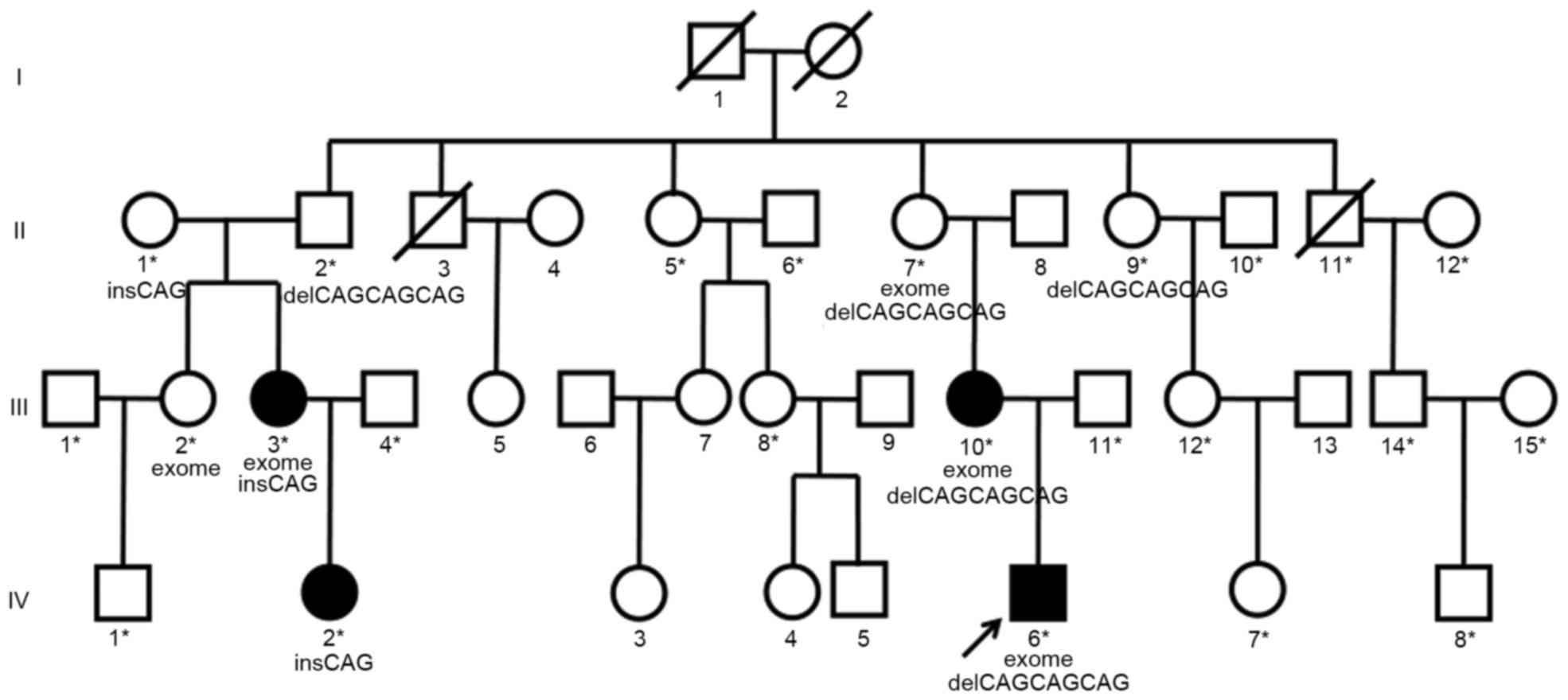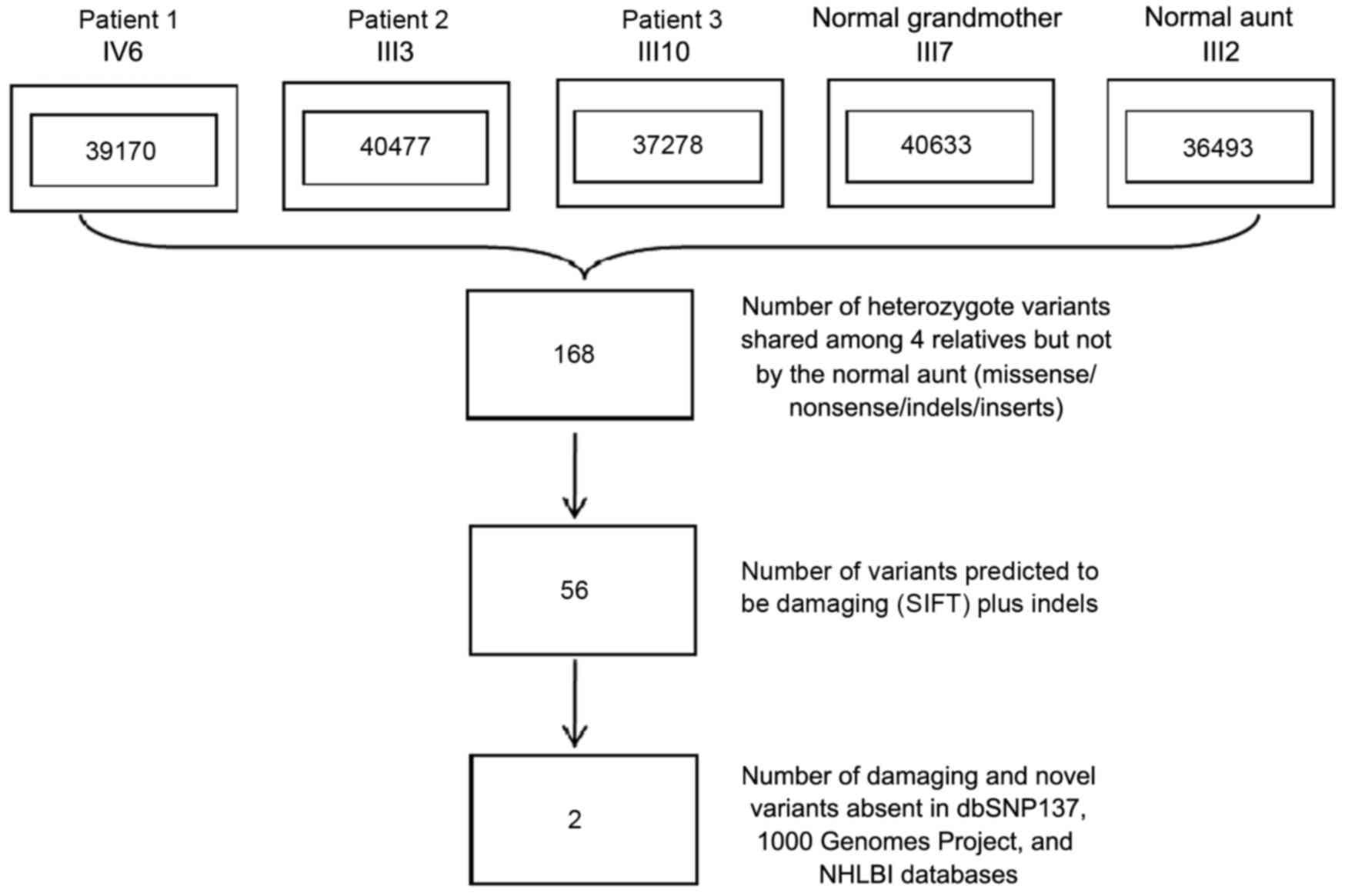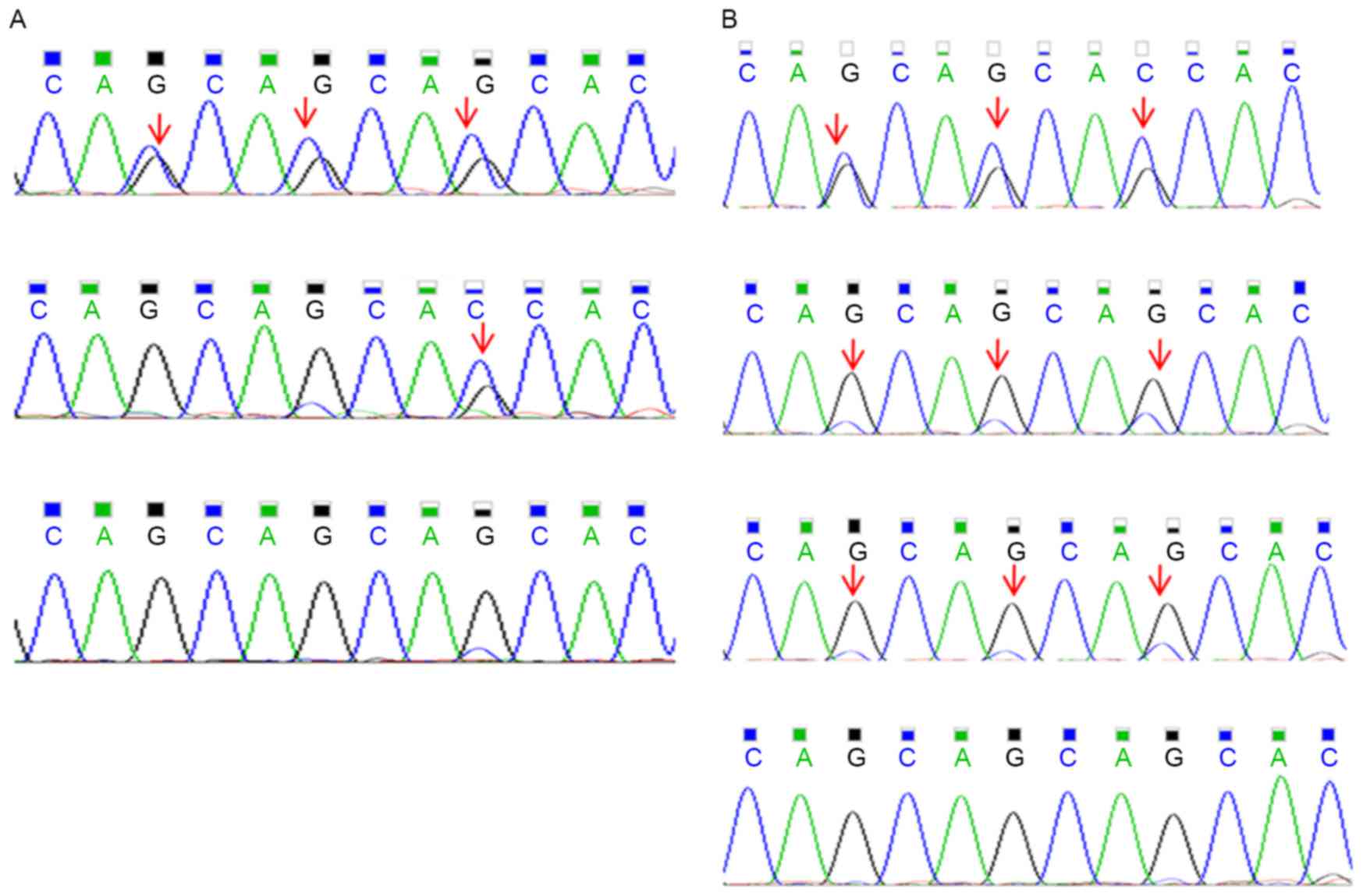|
1
|
Kokavec M and Bialik V: Developmental
dysplasia of the hip: Prevention and real incidence. Bratisl Lek
Listy. 108:251–254. 2007.PubMed/NCBI
|
|
2
|
Jacobsen S, Sonne-Holm S, Søballe K,
Gebuhr P and Lund B: Hip dysplasia and osteoarthrosis: A survey of
4151 subjects from the osteoarthrosis substudy of the copenhagen
city heart study. Acta Orthop. 76:149–158. 2005. View Article : Google Scholar : PubMed/NCBI
|
|
3
|
Stein-Zamir C, Volovik I, Rishpon S and
Sabi R: Developmental dysplasia of the hip: Risk markers, clinical
screening and outcome. Pediatr Int. 50:341–345. 2008. View Article : Google Scholar : PubMed/NCBI
|
|
4
|
Stevenson DA, Mineau G, Kerber RA,
Viskochil DH, Schaefer C and Roach JW: Familial predisposition to
developmental dysplasia of the hip. J Pediatr Orthop. 29:463–466.
2009. View Article : Google Scholar : PubMed/NCBI
|
|
5
|
Czeizel A, Szentpétery J, Tusnády G and
Vizkelety T: Two family studies on congenital dislocation of the
hip after early orthopaedic screening Hungary. J Med Genet.
12:125–130. 1975. View Article : Google Scholar : PubMed/NCBI
|
|
6
|
Wynne-Davies R: Acetabular dysplasia and
familial joint laxity: Two etiological factors in congenital
dislocation of the hip. A review of 589 patients and their
families. J Bone Joint Surg Br. 52:704–716. 1970.PubMed/NCBI
|
|
7
|
Wilkinson JA: Etiologic factors in
congenital displacement of the hip and myelodysplasia. Clin Orthop
Relat Res. 75–83. 1992.PubMed/NCBI
|
|
8
|
Cilliers HJ and Beighton P: Beukes
familial hip dysplasia: An autosomal dominant entity. Am J Med
Genet. 36:386–390. 1990. View Article : Google Scholar : PubMed/NCBI
|
|
9
|
Loughlin J, Mustafa Z, Irven C, Smith A,
Carr AJ, Sykes B and Chapman K: Stratification analysis of an
osteoarthritis genome screen-suggestive linkage to chromosomes 4,
6, and 16. Am J Hum Genet. 65:1795–1798. 1999. View Article : Google Scholar : PubMed/NCBI
|
|
10
|
Mabuchi A, Nakamura S, Takatori Y and
Ikegawa S: Familial osteoarthritis of the hip joint associated with
acetabular dysplasia maps to chromosome 13q. Am J Hum Genet.
79:163–168. 2006. View
Article : Google Scholar : PubMed/NCBI
|
|
11
|
Feldman GJ, Dalsey C, Fertala K, Azimi D,
Fortina P, Devoto M, Pacifici M and Parvizi J: The otto aufranc
award: Identification of a 4 Mb region on chromosome 17q21 linked
to developmental dysplasia of the hip in one 18-member,
multigeneration family. Clin Orthop Relat Res. 468:337–344. 2010.
View Article : Google Scholar : PubMed/NCBI
|
|
12
|
Marschall Y and Distl O: Mapping
quantitative trait loci for canine hip dysplasia in German Shepherd
dogs. Mamm Genome. 18:861–870. 2007. View Article : Google Scholar : PubMed/NCBI
|
|
13
|
Rubini M, Cavallaro A, Calzolari E,
Bighetti G and Sollazzo V: Exclusion of COL2A1 and VDR as
developmental dysplasia of the hip genes. Clin Orthop Relat Res.
466:878–883. 2008. View Article : Google Scholar : PubMed/NCBI
|
|
14
|
Feldman GJ, Parvizi J, Levenstien M, Scott
K, Erickson JA, Fortina P, Devoto M and Peters CL: Developmental
dysplasia of the hip: Linkage mapping and whole exome sequencing
identify a shared variant in CX3CR1 in all affected members of a
large multigeneration family. J Bone Miner Res. 28:2540–2549. 2013.
View Article : Google Scholar : PubMed/NCBI
|
|
15
|
Feldman GJ, Parvizi J, Sawan H, Erickson
JA and Peters CL: Linkage mapping and whole exome sequencing
identify a shared variant in CX3CR1 in a large multi-generation
family. J Arthroplasty. 29:(9 Suppl). S238–S241. 2014. View Article : Google Scholar
|
|
16
|
Li H and Durbin R: Fast and accurate
long-read alignment with Burrows-Wheeler transform. Bioinformatics.
26:589–595. 2010. View Article : Google Scholar : PubMed/NCBI
|
|
17
|
Plagnol V, Curtis J, Epstein M, Mok KY,
Stebbings E, Grigoriadou S, Wood NW, Hambleton S, Burns SO,
Thrasher AJ, et al: A robust model for read count data in exome
sequencing experiments and implications for copy number variant
calling. Bioinformatics. 28:2747–2754. 2012. View Article : Google Scholar : PubMed/NCBI
|
|
18
|
Wang K, Li M and Hakonarson H: ANNOVAR:
Functional annotation of genetic variants from high-throughput
sequencing data. Nucleic Acids Res. 38:e1642010. View Article : Google Scholar : PubMed/NCBI
|
|
19
|
Cinqolani P, Platts A, le Wang L, Coon M,
Nguyen T, Wang L, Land SJ, Lu X and Ruden DM: A program for
annotating and predicting the effects of single nucleotide
polymorphisms, SnpEff: SNPs in the genome of Drosophila
melanogaster strain w1118; iso-2; iso-3. Fly (Austin). 6:80–92.
2012. View Article : Google Scholar : PubMed/NCBI
|
|
20
|
Kumar P, Henikoff S and Ng PC: Predicting
the effects of coding non-synonymous variants on protein function
using the SIFT algorithm. Nat Protoc. 4:1073–1081. 2009. View Article : Google Scholar : PubMed/NCBI
|
|
21
|
Adzhubei IA, Schmidt S, Peshkin L,
Ramensky VE, Gerasimova A, Bork P, Kondrashov AS and Sunyaev SR: A
method and server for predicting damaging missense mutations. Nat
Methods. 7:248–249. 2010. View Article : Google Scholar : PubMed/NCBI
|
|
22
|
Schwarz JM, Rödelsperger C, Schuelke M and
Seelow D: Mutation taster evaluates disease-causing potential of
sequence alterations. Nat Methods. 7:575–576. 2010. View Article : Google Scholar : PubMed/NCBI
|
|
23
|
Kearns AE, Donohue MM, Sanyal B and Demay
MB: Cloning and characterization of a novel protein kinase that
impairs osteoblast differentiation in vitro. J Biol Chem.
276:42213–42218. 2001. View Article : Google Scholar : PubMed/NCBI
|
|
24
|
Chen G, Deng C and Li YP: TGF-β and BMP
signaling in osteoblast differentiation and bone formation. Int J
Biol Sci. 8:272–288. 2012. View Article : Google Scholar : PubMed/NCBI
|
|
25
|
Li X and Cao X: BMP signaling and
skeletogenesis. Ann N Y Acad Sci. 1068:26–40. 2006. View Article : Google Scholar : PubMed/NCBI
|
|
26
|
Kanzler B, Foreman RK, Labosky PA and
Mallo M: BMP signaling is essential for development of skeletogenic
and neurogenic cranial neural crest. Development. 127:1095–1104.
2000.PubMed/NCBI
|
|
27
|
Nakamura Y, Wakitani S, Nakayama J,
Wakabayashi S, Horiuchi H and Takaoka K: Temporal and spatial
expression profiles of BMP receptors and noggin during
BMP-2-induced ectopic bone formation. J Bone Miner Res.
18:1854–1862. 2003. View Article : Google Scholar : PubMed/NCBI
|
|
28
|
Ishidou Y, Kitajima I, Obama H, Maruyama
I, Murata F, Imamura T, Yamada N, ten Dijke P, Miyazono K and Sakou
T: Enhanced expression of type I receptors for bone morphogenetic
proteins during bone formation. J Bone Miner Res. 10:1651–1659.
1995. View Article : Google Scholar : PubMed/NCBI
|
|
29
|
Borner GH, Antrobus R, Hirst J, Bhumbra
GS, Kozik P, Jackson LP, Sahlender DA and Robinson MS: Multivariate
proteomic profiling identifies novel accessory proteins of coated
vesicles. J Cell Biol. 197:141–160. 2012. View Article : Google Scholar : PubMed/NCBI
|
|
30
|
Krieger JR, Taylor P, Gajadhar AS, Guha A,
Moran MF and McGlade CJ: Identification and selected reaction
monitoring (SRM) quantification of endocytosis factors associated
with Numb. Mol Cell Proteomics. 12:499–514. 2013. View Article : Google Scholar : PubMed/NCBI
|
|
31
|
Petersen PH, Zou K, Hwang JK, Jan YN and
Zhong W: Progenitor cell maintenance requires numb and numblike
during mouse neurogenesis. Nature. 419:929–934. 2002. View Article : Google Scholar : PubMed/NCBI
|
|
32
|
Choi YH, Jeong HM, Jin YH, Li H, Yeo CY
and Lee KY: Akt phosphorylates and regulates the osteogenic
activity of Osterix. Biochem Biophys Res Commun. 411:637–641. 2011.
View Article : Google Scholar : PubMed/NCBI
|
|
33
|
Mukherjee A and Rotwein P: Akt promotes
BMP2-mediated osteoblast differentiation and bone development. J
Cell Sci1. 22:716–726. 2009. View Article : Google Scholar
|
|
34
|
Tseng WP, Yang SN, Lai CH and Tang CH:
Hypoxia induces BMP-2 expression via ILK, Akt, mTOR, and HIF-1
pathways in osteoblasts. J Cell Physiol. 223:810–818.
2010.PubMed/NCBI
|
|
35
|
Hofmann A, Ritz U, Hessmann MH, Alini M,
Rommens PM and Rompe JD: Extracorporeal shock wave-mediated changes
in proliferation, differentiation, and gene expression of human
osteoblasts. J Trauma. 65:1402–1410. 2008. View Article : Google Scholar : PubMed/NCBI
|
|
36
|
Goltzman D, Hendy GN and White JH: Vitamin
D and its receptor during late development. Biochim Biophys Acta.
1849:171–180. 2015. View Article : Google Scholar : PubMed/NCBI
|
|
37
|
Lisse TS, Chun RF, Rieger S, Adams JS and
Hewison M: Vitamin D activation of functionally distinct regulatory
miRNAs in primary human osteoblasts. J Bone Miner Res.
28:1478–1488. 2013. View Article : Google Scholar : PubMed/NCBI
|

















